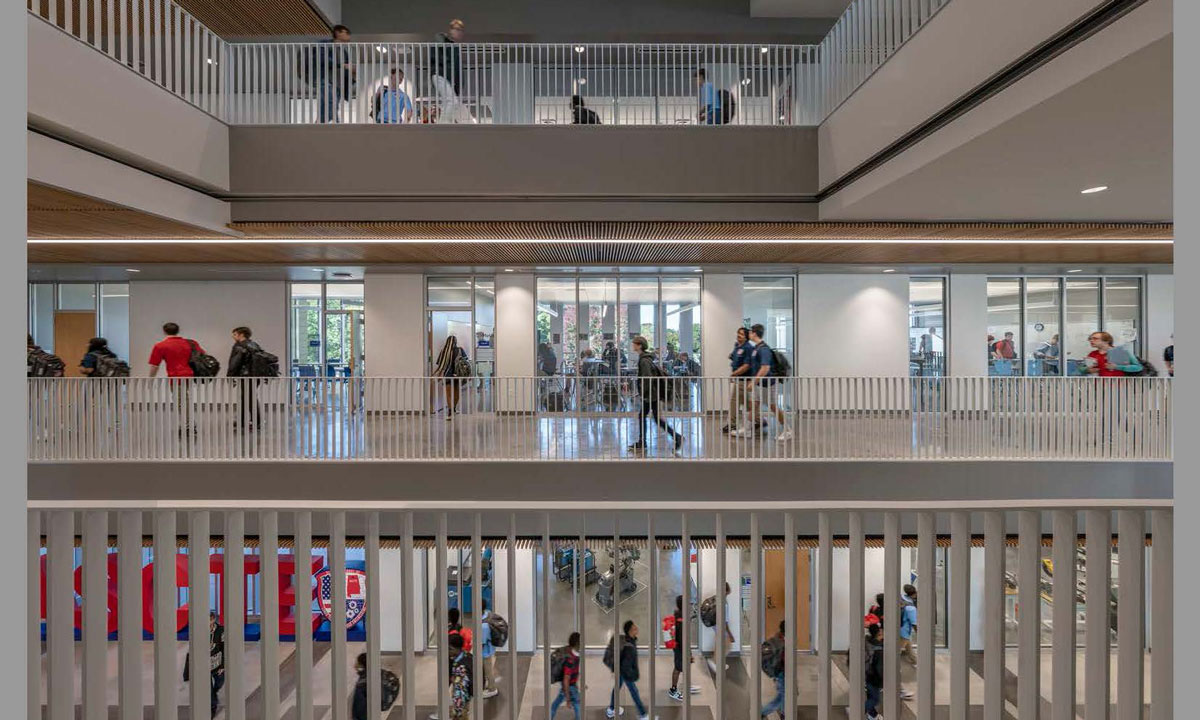Pentagon Worries about Lack of Young STEM Grads. Alabama HS May Have an Answer
Lingenfelter & Massey: Statewide cyber tech & engineering magnet school is tuition-free & mastery-based — and one-third of students live there.

Get stories like this delivered straight to your inbox. Sign up for The 74 Newsletter
Alabama is taking the lead in helping to address a key defense deficit — a dearth of U.S.-born high school graduates skilled enough in science, technology, engineering and math to enter the national security workforce immediately upon graduation or after earning a university degree.
The Alabama School of Cyber Technology and Engineering, which opened its doors in 2020 — during the height of the pandemic — is the nation’s only high school focused on the integration of cyber technology and engineering into all academic disciplines. It is located in Huntsville, home to the Army Aviation and Missile Command and several major defense contractors.
A publicly funded commuter and residential 9-12 magnet school serving students from around the state, the Alabama School of Cyber Technology and Engineering offers free tuition for a diverse student body that is about 30% African American and 37% female. Some 120 of the 333 students live in the school’s dormitory. Students are charged only for the cost of food, which they split with the state. Local contractors help sponsor the school through donations.
The school is both college preparatory and vocational — aimed at readying students for well-paying careers upon graduation in high-demand, science-based fields, with the Department of Defense and with military contractors.
Underpinning the school’s focus is the urgent need for more American citizens to enter the national security workforce, because the country is falling behind technologically in several areas and U.S. citizenship is required to receive a security clearance.
The need is substantial. While China has four times the U.S. population, it has eight times as many STEM grads, and Russia has almost four times more engineers than the United States. And the problem will only get more pronounced as the need grows for a workforce that can develop new and increasingly complicated technologies that will be essential for national security.
“Many of the proposed advanced manufacturing and technology solutions to workforce shortages (particularly automation) and manufacturing issues (including additive manufacturing, hybrid manufacturing and digitalization) require a higher level of baseline skills. To implement these solutions, individuals must be trained and able to work in teams that combine deep engineering expertise with data analytics and policy knowledge to enable innovation and transform the manufacturing space,” the Department of Defense wrote in its most recent report on U.S. industrial capabilities.
STEM curricula focused on technical careers “must also be expanded into middle and high school education to attract and prepare candidates for advanced manufacturing at all levels — from engineering to the factory floor,” the report said.
That’s exactly what the Alabama school is accomplishing.
During its first year, in 2020, the school had 70 students set up in classroom space at a local university. By the following year, enrollment had doubled. When the current school year started in August, the headcount was 333 students, with more expected in successive years as word spreads about the school’s focus and unique approach to education.
No formal entrance exam is required. Prospective students provide three years’ worth of academic transcripts, attendance sheets and disciplinary records, as well as recommendations from a current STEM teacher and another from a guidance counselor. They submit letters of interest from themselves and their parent.
Applicants from home schools or private schools additionally must provide results from a standardized assessment, such as the SSAT. But there is no minimum qualifying score for admission. Scores are one of many evaluation criteria and are meant to provide insight into the academic potential of incoming applicants. Students who advance in the application process also undergo a personal interview.
Once admitted, students are not allowed to fail their classes. Rather, they must master concepts to advance; they must repeat the class until they achieve proficiency. Proficiency is particularly important because higher-level math and science classes, with their keen focus on cyber technology and engineering, build on concepts from earlier courses. The school doesn’t use a traditional grading system; rather, teachers rate students on a continuum reflecting various levels of mastery of concepts, then correlate those to a 4.0 grade-point scale.
Students receive four years of instruction in math, science, language arts and social studies, but with cyber and engineering curriculum woven throughout. So, for example, in the first year of social studies, students are taught the history of engineering and technology. The second year is the history of cryptography taught through the lens of world events, such as World Wars I and II. By the third year, students are taught civics and economics, touching on cyber-related concepts like cryptocurrency and blockchain.
They engage in real-world learning through internships with defense companies such as Raytheon, a major corporate sponsor, which accepted 16 students from the school as interns this year.
Tailoring the education for high-tech industries and ensuring proficiency in concepts all along the way ensures that students are math and science literate but also well-rounded. Thus far, the results are impressive. Some students are receiving job offers upon graduation, while others have been accepted at top-notch schools like Georgia Tech, Vanderbilt, the University of Texas, Georgetown University, American University and the University of Southern California.
The nation is facing a sweeping talent gap in STEM that is a national security vulnerability. Alabama School of Cyber Technology and Engineering offers one powerful model for closing that gap while driving student achievement.
Get stories like these delivered straight to your inbox. Sign up for The 74 Newsletter

;)

